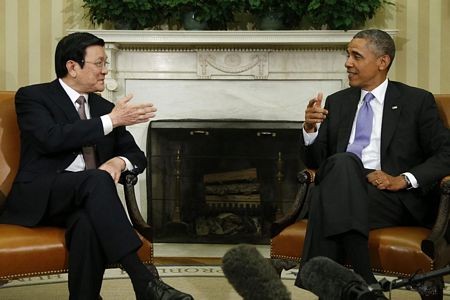(VOVworld) – Vietnam and the US established the framework of comprehensive partnership in 2013. This landmark accomplishment has generated momentum for bilateral cooperative mechanisms and contributed to ensuring peace, stability, cooperation, and development in Asia-Pacific and the world.
 |
US President Barack Obama held talks with Vietnamese President Truong Tan Sang at the White House in July, 2013 (photo: VNA)
|
Vietnam and the US exchanged many visits at all levels. Top Vietnamese leaders including President Truong Tan Sang, Prime Minister Nguyen Tan Dung, and Deputy Prime Minister Nguyen Xuan Phuc toured the US. Hanoi welcomed high-ranking American leaders like the Treasury Secretary, the Secretary of Health and Human Services, trade representatives, a deputy National Security Advisor, the Commander-in-chief of the Pacific Fleet, and most recently, Secretary of State John Kerry. The visits have enhanced political trust and deepened cooperation in several fields. The establishment of a comprehensive partnership in 2013 was an important milestone in the Vietnam-US relationship.
Significant change
The Vietnamese Ambassador to the US said 18 years after normalizing relations, Vietnam and the US have made lasting progress in healing the wounds would of war and building a trustful relationship. The two countries announced their comprehensive partnership during President Truong Tan Sang’s visit to the US last July. Ambassador Nguyen Quoc Cuong said: “Since the establishment of the Vietnam-US comprehensive partnership, bilateral relations have progressed rapidly in all areas of politics, diplomacy, security, science, technology, and education. Vietnam, the US, and 10 other countries are negotiating the Trans-Pacific Partnership (TPP). Bilateral trade has grown dramatically. American Secretary of State John Kerry and Vietnamese Foreign Minister Pham Binh Minh signed an agreement to open more opportunities in civil nuclear cooperation.”
Regarding education cooperation, the US is pushing ahead the establishment of a university in Vietnam. Among the 10 Southeast Asian nations, Vietnam had the largest number of students in the US in 2013. Secretary of State Kerry said during his visit to Vietnam last December: “Education and people to people exchange are laying the foundation for a close US-Vietnam partnership in years to come. We’ve made great progress in strengthening those ties. Today, more than 16,000 Vietnamese students are studying in the US, more than almost other countries in the world. We look forward to building on that success by continuing to work with the Vietnamese government to establish a university in Vietnam in the near future.”
There are some important pending issues between Vietnam and the US. The most regularly mentioned are differences in their views on democracy, human rights, and trade tariff barriers. The leaders have agreed to address these differences through dialogues to improve mutual understanding.
Mutual cooperation and development
The normalization of diplomatic relations in July, 1995, was the fruit of bilateral efforts. 18 years later, in a spirit of “setting aside the past and heading to the future”, Vietnam and the US elevated their relations to comprehensive partnership. Mr. Kerry told VOV: “Despite the difficult history that our nations shared, I’ve always impressed with many visits that I’ve made here from working on a POW/MIA to lifting the embargo, normalization, and trying to truly have a definition of peace and stability between our countries. We begin to approach the 20th anniversary of normalized relations, we know that a strong, proper, and independent Vietnam that respects the rule of laws and human rights would be a critical partner of the US in many regional and global challenges we face together.”
Normalizing relations was achieved by frank dialogues between leaders, even on sensitive issues. The comprehensive partnership signed in 2013 has laid the foundation for greater achievements in the future.